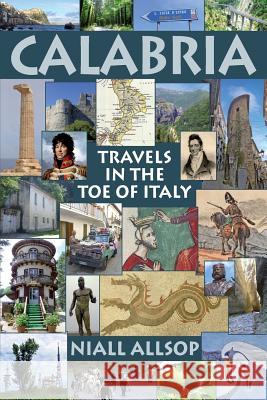Calabria: Travels in the toe of Italy » książka
Calabria: Travels in the toe of Italy
ISBN-13: 9781533514004 / Angielski / Miękka / 2016 / 572 str.
Calabria is not a guide to Calabria but rather a book about Calabria.
Since 1777, when Henry Swinburne, first travelled in Calabria in search of Magna Graecia (Calabria's Greek heritage), and then wrote about his experiences, there have been a further dozen travellers, including one woman, who have written travelogues in English (as opposed to travel guides) about Italy's remote toe.
Some, like Edward Lear, George Gissing and Norman Douglas, became well-known literary figures in other fields but most were just educated people with time on their hands for whom travelling in the south of Italy was a huge adventure, perhaps fuelled by the adrenalin of the pioneer. What also made them different is that they shared their experiences: frequently with humour, usually with empathy, occasionally with arrogance but always with the curiosity and insight of the traveller, as opposed to the tourist.
Until Italian unification (1860), Calabria was part of the Two Sicilies, the largest and wealthiest part of the Italian peninsula which included the regions south of Naples (the capital) and Sicily itself. Because of its remoteness and lack of an adequate transport infrastructure it was-and to some extent still is-viewed as an inhospitable and unappealing place, home to brigands and bandits and incoherent natives of doubtful ancestry. Post-unification, Calabria remained a place that few had heard of, still fewer visited; even the most recent such traveller, Henry Morton, was not unaware that, even in 1967, he was breaking new ground.
Because such travelogues have never been viewed as historical sources in themselves, sometimes the writers' first-hand experiences throw new light on accepted, home-grown, myths about the region, such as the deaths of Alaric the Goth and Joachim Murat, the Fratelli Bandiera escapade and the brigand Musolino myth.
While occasionally Calabria retells Calabrian history it is, above all else, a fusion of the experiences and impressions of thirteen travelling pioneers alongside those of the author, himself a traveller to Calabria, albeit one who stayed, made it his home and has immersed himself in its past and its present and its present and will be a part of its future.
It is worth repeating that Calabria is not a guide to Calabria but rather a book about Calabria: written with empathy, insight and wit, Calabria unveils, through the eyes of the traveller, a part of Italy that, even today, few know well. Calabria's thematic format includes chapters on every facet of life, past and present, atop Italy's remote toe: from Magna Graecia to amusing episodes; from spectacular mountains to devastating earthquakes; from remarkable people to the scourge of the mafia.
Without doubt Calabria is the definitive book on Calabria in English."
Zawartość książki może nie spełniać oczekiwań – reklamacje nie obejmują treści, która mogła nie być redakcyjnie ani merytorycznie opracowana.











